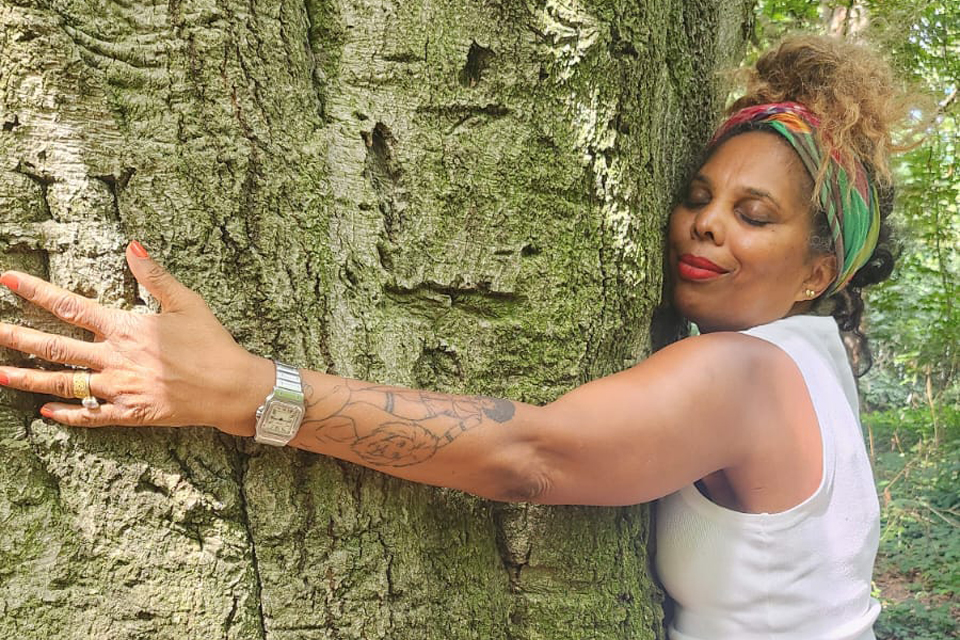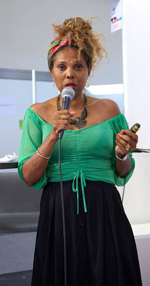
The Well Project interviews Louise Vallace, community advisory board member and A Girl Like Me blogger, for our "Spotlight: Women Making a Difference" series.
How did you learn about The Well Project?
I learned about The Well Project online. Five years ago, I searched for "women's HIV" in my web browser - and The Well Project popped up!
When I navigated the website, I was just so amazed at the feel and community vibe. The website was comprehensive, informative, friendly, open, fun, and balanced. I felt I had come home to a space where I would feel comfortable and understood. I wanted to feel part of the community and started to write blogs for A Girl Like Me and engage with the other bloggers.
How did you get your start in HIV advocacy?
I began my HIV advocacy through social media, initially sharing content about yoga, plant-based diets, nature, and overall well-being. After years of therapy, where I worked to release patterns that no longer served me, I developed the tools and foundation to confidently speak out about my HIV status. This personal journey helped me step into advocacy and use my platform for greater impact.
Are you particularly passionate about a specific topic or demographic?
I am passionate about inclusivity; I am passionate about creating spaces where people feel seen; I am passionate about living in the present and thriving. On the days where I felt uncertain about the advocacy work, I would go to A Girl Like Me blogs and get inspired to keep going.
At what age were you diagnosed?
I was 37 years old, divorced with three children; it was 2007.
When did you know that you wanted to be an advocate?
I knew I wanted to be an advocate in 2018. I went to a women's HIV workshop, and for the first time I met other women living with HIV. Some of the women were vocal about their status and others were not. I felt empowered by the women I met - and I was inspired to be an advocate.
Do you think women living with HIV face unique challenges?
There are particular challenges for women living with HIV due to limiting patriarchal systems that are in place. Women are faced with cultural expectations, such as traditions and gender roles which may force some women to prioritize family over personal well-being. Women might experience blame or rejection from partners, family, or society/workplace, further isolating them. There are many women experiencing domestic abuse - HIV can compound domestic abuse.

How do you address those challenges through your work?
I have a podcast called Aunty Lou's Hour. I talk to people from around the world about their experiences and how they overcome challenges. I do this in the hope that there are people listening to the podcast who feel less lonely and more inspired.
I am a speaker and have spoken about my own experience with domestic abuse, working in a senior role whilst being a single parent, alongside other pressures.
I have not yet spoken out about the sexual abuse I experienced as a child, as I am still processing this. When the time is right, I will write a blog about it.
In today's society, I notice that some women disconnect from their feminine energy. I have created an online course that teaches students how to balance their masculine and feminine energy using different types of yoga in parallel with learning how to cook plant-based recipes.
Over the last 40 years, how do you feel the challenges surrounding HIV stigma have evolved, if at all?
Some fantastic work has been done over the years to address stigma, but I feel that there is still a lot more work to be done. I remember the stigma of HIV/AIDS from the 1980s and how it affected people.
When I found out I had HIV, I stigmatized myself; the shame I carried around with me was draining.
Education is the key in addressing stigma.
I run a self-funded project called "Aunty Lou's Street Talks," which I began for two key reasons. First, I want to support people living with HIV who may feel isolated or fearful due to stigma. My goal is to let them know that efforts are being made to combat this stigma actively. Second, I aim to educate the wider public about HIV and encourage more people to get tested.
During these street talks, I've noticed that people have varying levels of understanding when it comes to HIV. The epidemic and media portrayal from the 1980s have changed significantly. Today, we no longer refer to the virus as AIDS because of the availability of effective medication that prevents the progression to AIDS. While people in the HIV community are aware of this, many outside the community are not.
What advice would you offer a woman who wants to get started in HIV advocacy? Any specific guidance about getting ready to publicly share her HIV status for the first time?
If a woman wants to get started in HIV advocacy, she should ask herself why she is doing it. She should ask herself this question often.
Also, be mindful of any pressure to become an advocate. Do it because it feels right in your body, mind, and soul.
My last bit of advice is tap into various organizations to stay up to date with developments and get to know other women in the community. Read The Well Project's A Girl Like Me blogs! 🙂



